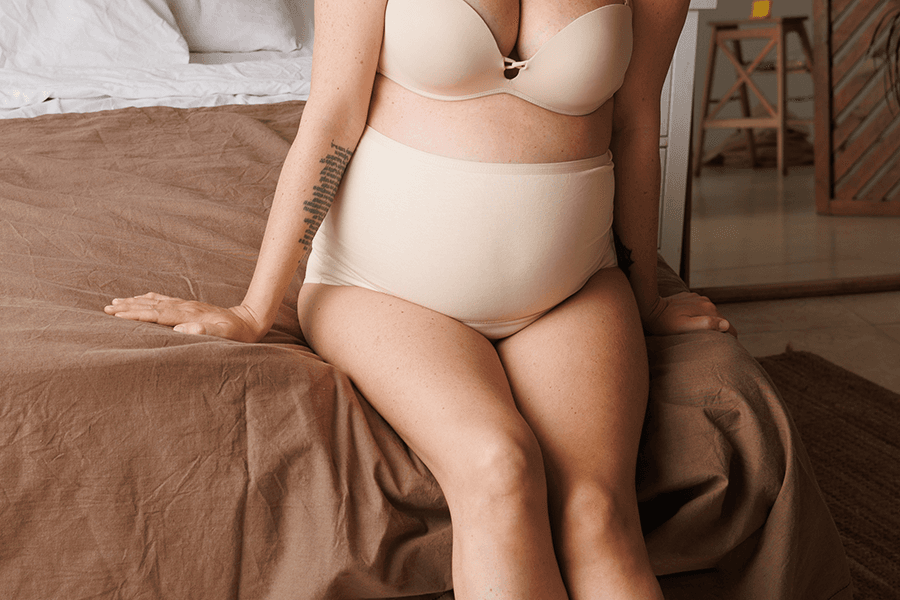If you start bleeding after pregnancy week 22+0—regardless of how much blood—always contact your healthcare provider or midwife for a consult and to see if you need to have an extra checkup or if you can wait. Bleeding during the latter part of your pregnancy can have more serious consequences for you and your baby. First, make sure that the bleeding is from your vagina and not your rectum. Many women have bleeding hemorrhoids around the middle and particularly toward the end of pregnancy.
Some reminders about bleeding
- fresh bleeding is light red to dark red.
- reddish brown blood means that the bleeding started earlier and has ended.
- bleeding is considered heavy when you saturate a pad in one hour or if you experience clotting.
- after week 22+0, call your healthcare provider for a consult, regardless of whether you are bleeding a little or heavily.
- it is not always possible to find the cause of the bleeding.
If you are experiencing any of the following symptoms, seek emergency medical care immediately:
- if you are bleeding, regardless of the amount, and have abdominal pain, either on one side of your abdomen or your lower abdomen.
- if you are bleeding, regardless of the volume, and feel generally unwell (you feel ill, faint and tired)
- if you are bleeding to such a degree that you soak through a pad in one hour or if you experience clotting.
To determine what is causing bleeding, you will have a pelvic exam and an ultrasound, if necessary.
Causes of bleeding after week 22+0:
Bleeding can be the first sign that childbirth has started, what is called an “initial bleed” or “bloody show”. The bleeding comes from small vessels in the cervix that tear as it starts to dilate. If you have gone full term, in other words you are in week 37+0 or passed week 37+0, the initial bleeding is a welcome sign of labor. However, if it is earlier than so, this is not as welcome but may instead indicate that labor has started too early.
Bleeding during this phase of pregnancy can also be caused by infections, cell changes or cervical polyps. A cervical polyp is usually a harmless benign growth on the cervix that does not affect pregnancy itself. However, it bleeds easily and can cause heavy bleeding. Occasionally, the polyp needs to be surgically removed.
You can read more about infections and cell changes under Bleeding early pregnancy up to week 11+6.
If the placenta is lying low in your uterus, or partially or totally covering the cervix, called “placenta previa”, bleeding is a common complication, particularly when the baby in the uterus grows and pressure on the placenta increases. The position of the placenta inside the uterus can be seen during an ultrasound exam. If the placenta is lying low during the first ultrasound, more ultrasounds will be performed during your pregnancy to monitor its position. Some women need to be admitted to the hospital for bleeding observations once or more frequently during pregnancy if the placenta is partially or fully covering the cervix. Medication may be necessary to help the blood coagulate faster and stop the bleeding. Normally, the placenta moves higher up in the uterus as it grows, making vaginal delivery possible. However, if the placenta is partially or fully covering the cervix toward the end of pregnancy, it will be necessary to deliver the baby with a cesarean section. Avoid sexual intercourse during the last part of your pregnancy if the placenta is fully or partially covering the cervix. Speak with your midwife if you have questions or are worried.
In rare cases, bleeding could be the first sign that the placenta has started to detach from the wall of the uterus. If this happens, it typically happens toward the end of pregnancy. This can be a very serious, life-threatening situation for both the woman and the baby. Get medical attention immediately if you bleed and your uterus is hard, you have contractions, severe abdominal pain or a general sense of feeling unwell (you feel sick, faint and tired).
Source:
- Lärobok för barnmorskor. Faxelid, E. Course literature 2001.
- Myles Textbook for Midwives. Fraser, D. och Cooper, M. Churchill Livingstone 2003.
